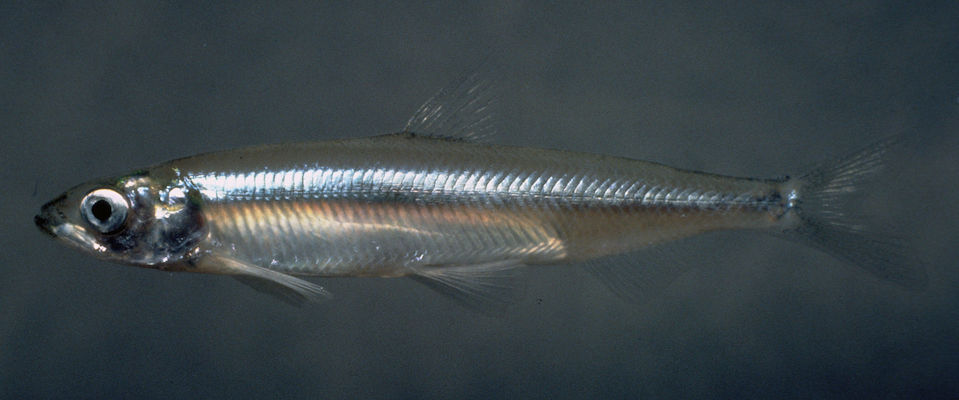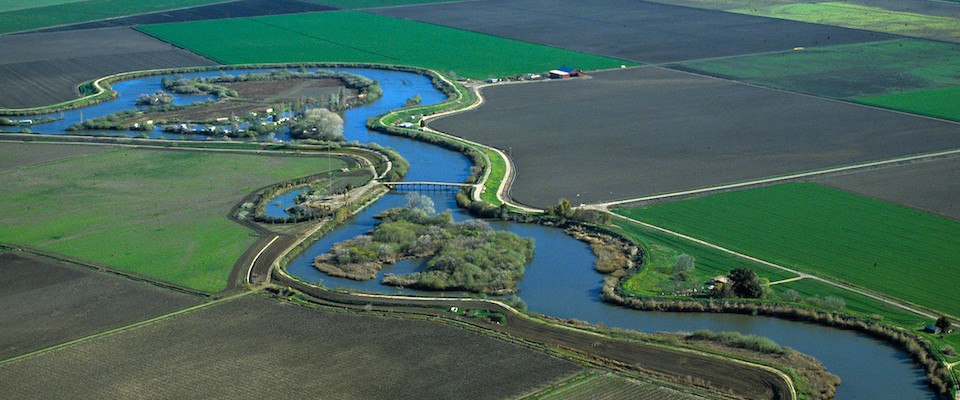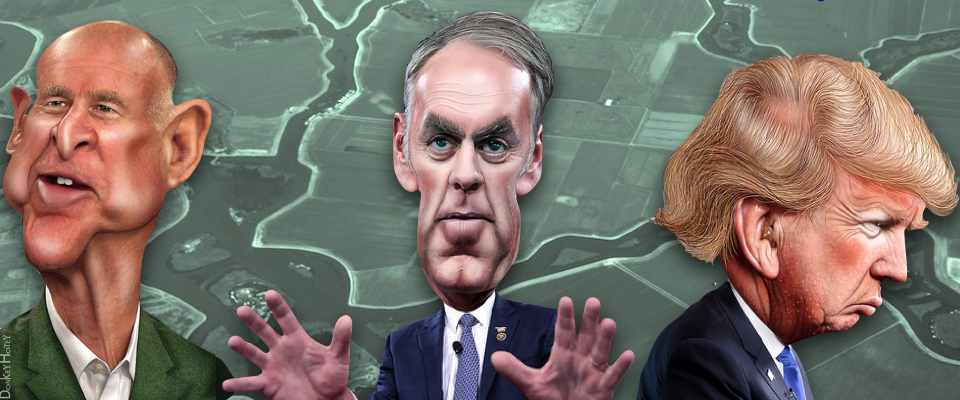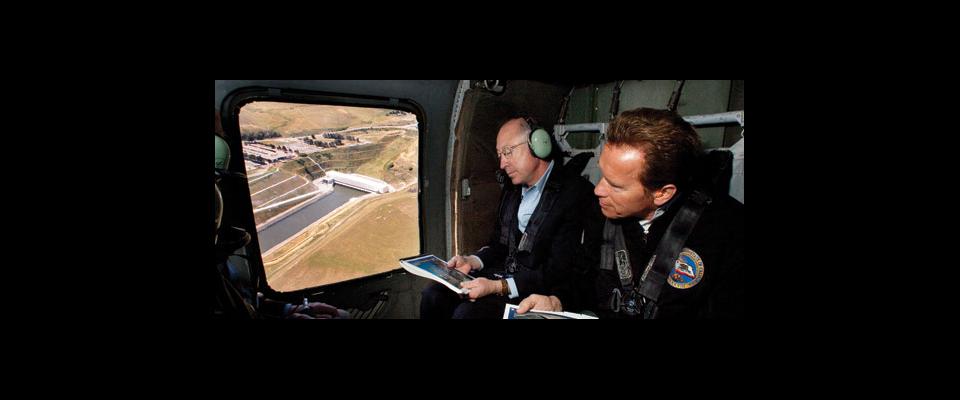When Donald Trump barnstormed through California during the recent presidential campaign, he declared that the California drought was a myth, a canard promulgated by conservationists to protect a “three-inch fish”—i.e., the endangered delta smelt. He huddled with San Joaquin Valley farmers, taking on their cause as his own, and declared we’d have plenty of water if we didn’t “shove it out to sea” in efforts to protect the fisheries and ecosystems of the Sacramento/San Joaquin Delta.
Environmentalists didn’t pay too much attention to Trump’s fulminations, secure in their faith that the iconoclastic real estate developer would never get elected. While the Delta is hardly in tip-top shape—the Delta smelt, widely regarded as a health indicator of the Bay/Delta estuary, is at all time lows, and other keystone species, including Chinook salmon, also are suffering—they figured Trump wouldn’t be around in January to administer a coup de grace to the fish and send the water gushing to the megafarms of the western San Joaquin.
Well, they were wrong, of course. So people (and salmon) want to know: Were Trump’s tirades against pointy-headed environmentalists and tiny worthless fish mere bombast, or does he really intend to cut Delta-Bay flows and deliver all the water San Joaquin almond growers want? In other words, how bad does it look for the Delta?
There are some rather hard and fast regulations on just what the Department of Interior can do in regard to water projects, says Cal environmental regulation professor Holly Dorms … Interior can’t just decide willy-nilly to close the spigot on through-Delta flows and pump it all to agribusiness.
Pretty bad, it turns out. First up is the news that the next Congress seems certain to approve a deal for the massive Westlands Water District that forgives $375 million in federal debt, locks in long-term water contracts, and relieves the federal government of the obligation to build drainage facilities to treat the selenium-tainted water that results from the irrigation of western San Joaquin Valley lands. Fisheries advocates have long opposed the deal because it assures that Westlands will get vast quantities of water while side-stepping the toxic drainage issue.
Next, Trump appointed David Bernhardt, a Westlands lobbyist, to lead the Department of Interior transition team for the new administration. U.S. Representative Devin Nunes, (R-Visalia), another avid supporter of Westlands, has been appointed to the executive committee of Trump’s general transition team. Nunes is an advocate for HR 2898, a pending bill that would provide San Joaquin farmers more water, fund the construction of new reservoirs, and kill a landmark San Joaquin River restoration program that would assure year-round flows and revitalized salmon runs for the stream.
Both men will have broad scope in shaping policies affecting the disposition of California water and the fate of the Delta. In short, the coming years are liable to be tough ones—tougher than usual, anyway, for California salmon.
Still, things are hardly carved in stone.
“Bernhardt was listed for Interior’s transition team before an announcement came that the administration would not consider anyone for an appointment who was a lobbyist,” says Holly Doremus, a professor of environmental regulation at Berkeley Law and the co-faculty director of the university’s Center for Law, Energy and Environment. “That may or may not include people on the transition teams. So things are a bit up in the air.”
Further, says Doremus, there are some rather hard and fast regulations on just what the Department of Interior can do in regard to water projects, and that includes California’s federal Central Valley Project (CVP), which delivers water to the San Joaquin Valley. Interior can’t just decide willy-nilly to close the spigot on through-Delta flows and pump it all to agribusiness.
But that doesn’t mean Congress can’t change the rules of the game.
“I think it’s extremely likely that Congress will pass something like HR 2898,” says Doremus. “They did it during each of the last two years, though the Senate didn’t pass companion legislation, and Obama certainly wouldn’t have signed it. That’s likely to change now.”
HR 2898 aims to skirt a state law in a “bizarre” fashion, says Doremus. Under California’s statutes, reservoir managers are required to keep fisheries below dams in good condition. For the San Joaquin River—before it dried up 65 years ago, anyway—fisheries meant salmon runs, which required cold water and plenty of it. As written, HR 2898 indicates that the “good condition” provision would be satisfied by maintaining warm-water fisheries below the river’s main barrier, Friant Dam. “Warm-water fisheries” means non-native striped bass, black bass, carp and catfish, not salmonids, says Doremus.
“I don’t think the U.S. Congress can determine what does and does not satisfy state law,” Doremus says. “But there are other ways around it. If they make the case that state law conflicts with federal law, [a Republican Congress] could get their way [i.e., less water for the Delta and more for western San Joaquin Valley irrigators]. Or they could get exemptions from the U.S. Endangered Species Act, which is protecting Delta smelt and salmon. Or they could make significant changes to the way the federal Central Valley Project is operated. In general, they could make it harder to protect endangered species and easier to deliver water to irrigators without actually getting rid of the ESA.”
None of that bodes well for the Delta or its beleaguered fisheries. But don’t put all the blame on Republicans, says Cal Professor of geography Richard Walker: Democrats are also culpable in the undermining of Delta protections.
“Actually, I’m not sure things will be all that much worse under Trump,” says Cal geography professor Richard Walker. “California Democrats are in bed with powerful agricultural interests, and have not served us well on water policy. Westlands has been the tail wagging the water policy dog for years.”
“Actually, I’m not sure things will be all that much worse under Trump,” says Walker. “California Democrats are in bed with powerful agricultural interests, and have not served us well on water policy. Westlands has been the tail wagging the water policy dog for years.”
Walker points out that Senator Dianne Feinstein has long lobbied on behalf of Westlands and other powerful South State irrigators, and that Governor Jerry Brown is obsessed with the idea of building the Twin Tunnels, a retread of the peripheral canal, a failed diversion project Brown flogged during his first tenure as governor in the 1980s. Like the peripheral canal, the tunnels would expedite water deliveries from the Delta, and are opposed vehemently by environmentalists, fisheries advocates, and Delta farmers.
“Western San Joaquin growers are always crying because they have some of the most junior water rights in the state, so they’re the first to be cut off,” says Walker. “But that’s as it should be. They have no local water. The western San Joaquin is lousy farmland, full of toxic selenium that kills fish and wildlife when it drains to the San Joaquin River and the Delta. If we took the money [from the pending Westlands settlement with the Federal Government that locks in their water supply and relieves them of drainage responsibilities] we could buy out all the land in the district, retire it, end the drainage problem, and save a million acre feet of water a year. [A single acre foot is about 325,000 gallons, or about enough water to support two families for a year.]”
Walker says Jerry Brown generally has been a good governor, “but he seems to have this blind spot about agribusiness and water. It befuddles me. I don’t know if it’s filial devotion to his dad [Governor Pat Brown, who was instrumental in the construction of the State Water Project], or that he considers himself a man of the soil, or what. But the obvious solution is to stop delivering massive amounts of water to the toxic soils of the western San Joaquin. It’s madness. We have enough water in this state for people, for sustainable agriculture, for the Delta and its fisheries. We just have to use it sensibly.”





















